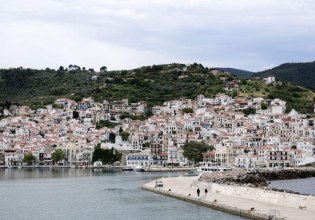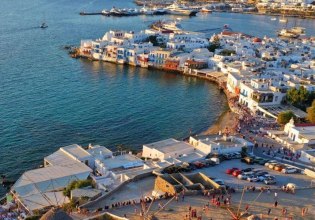Can humans defeat ageing;
The discussion turns to the phenomenon of Ikaria. So, what’s the secret of its inhabitants’ longevity?
By Eri Vardaki
Can humans defeat ageing? Are there any mechanisms that can slow it down? These are some of the questions that Dr David Weinkove is trying to answer. The British scientist with Greek roots (his grandmother came from Kefalonia) – assistant professor in the Department of Biosciences at Durham University and chairman of the British Society for Ageing Research (an organisation founded in the 1930s to fund, support and disseminate high quality research in the biology of ageing) – specialises in discovering active substances that slow down ageing and in identifying their mechanism of action.
In 2018, he founded Magnitude Biosciences, a CRO (Contract Research Organisation), which carries out scientific studies on behalf of third parties. The Greek scientist, Michael Fasseas, – responsible for supervising all experiments at Magnitude Biosciences- is also responsible for keeping the timelines, for running the laboratory and for modifying the studies when necessary.
A worm hides the answers
Both of them have many years of experience in the scientific study of the nematode worm C. elegans. «The nematode C. elegans (ed: Caenorhabditis elegans) is a small worm that reaches 1 mm in length, but about 1/3 of its genes can be also found in humans,» they explain when talking to VIMAGAZINO. «Studies on this warm have started in 1966 and, since then, it has provided important insights, concerning even the study of ageing. It was the first multicellular organism whose DNA was fully sequenced. This paved the way for human DNA as well.”
As they say, the C. elegans nematode is an ideal model for experiments, as it provides the complexity needed. «It is an organism simpler than mammals, but it has a nervous system, a muscular system, a reproductive system and an intestine. It lives about 2-3 weeks and, as it ages, its movement slows down, because it depends on its health. So, by analysing its mobility, we get a picture of its health.»
Thus, at Magnitude Biosciences they are studying the effect that ageing has on the health of worms and whether different interventions, namely drugs or probiotics, can have a positive effect, i.e. whether they delay ageing. “The same technology is also used to study toxicity, i.e. to assess to what extent one substance is more or less toxic than another. Beyond that, our laboratory adapts to the client’s needs and every project is different,» they added.
As they explain, many of their clients are companies that are developing a dietary supplement or a drug, aiming at delaying ageing in humans. «Ιn practice, Magnitude Biosciences is conducting trials on worms and the results of these trials help in making important decisions regarding either their next steps or the claim of additional funding. For example, we recently completed a study for Five Alarm Bio, a start-up developing an anti-aging drug. They already had some encouraging results in cell culture, but they wanted data from a whole organism. We had an excellent collaboration and our study showed us that their active ingredient did delay aging in the worms. Any similar study in mice would have been much more expensive,» they continue.
Previously, they had completed a study for Michelin. «Car tires release particles into the environment and manufacturers are trying to develop methods to minimise any toxic output. By comparing, with the use of worms, the toxicity of various samples they sent to us, we collaborated with Michelin chemists and provided them with high quality data that was used for R&D decisions.»
Of particular interest is the technology they have created to study the nematode worm C. elegans. «In order to see and handle a C. elegans you need a microscope, but we have developed technology based on camera arrays that allow us to monitor its movement without interference for 7 or even 10 days. In this way, we can measure its health status and to what extent it is affected by its age or the presence of other factors, such as drugs or probiotics. The technology we have developed is unique and we are constantly manufacturing new machinery to increase our efficiency,» they add.
So what do they believe? Will humans eventually reach the point of defeating ageing? «To answer that question, there are two sub-questions we need to consider in the first place,» they explain. «The first question is whether we are going to live longer and the second has to do with whether we are going to stay healthy for longer. We believe the latter question is more important as it also determines the quality of our lives when ageing. After all, this is the question that really matters to us and that’s the reason why we measure the «healthspan» of worms rather than their lifespan. We do believe that significant progress will be made in the coming years, as there is a huge effort going on globally and we are very happy to be part of it,» they say.
But can research into ageing help us tackle diseases? «There is no doubt that research which focuses on prolonging our health and on understanding our biological mechanisms will also help us understand diseases, as many of them are related to the ‘wear and tear’ of time,» they point out. «This is particularly evident with neurodegenerative diseases, such as Alzheimer’s or Parkinson’s. In fact, for these diseases there are also model worms we use.»
Balanced diet is the key
Are there any mechanisms today to slow down ageing? «We know that a healthy lifestyle, i.e. frequent exercise and a balanced diet, such as the Mediterranean diet, combined with modern medicine, can significantly extend our lifespan and the quality of our life. Drugs or dietary supplements will be effective only in combination with a healthy lifestyle,» they reply.
Are intermittent dieting and exposure to cold temperatures some practices that increase life expectancy? «There are studies that show that interval dieting can help with weight loss or with treating some metabolic diseases, so indirectly it could, but we don’t have enough data to make the claim that interval dieting increases life expectancy. You know, there are some diets that promise miracles, but we have to think about what suits us and our lifestyle. Some kinds of diets are dangerous. It may sound a bit trivial, but the best solution is frequent exercise and a balanced diet.
Approaching immortality?
But what about life expectancy? For example, Harvard genetics professor David Sinclair, in his book «Lifespan», argues that human life expectancy will be extended to 150 years, if we apply modern knowledge concerning slowing down ageing. Is this a view they share? «We have yet to see anyone live 150 years but, yes, it could happen. If it happens, we hope that they will be able to enjoy their life to the fullest. Therefore, at Magnitude we insist on measuring healthy life span (Healthspan) and not just lifespan,» they reply.
The discussion turns to the phenomenon of Ikaria. So, what is the secret of its inhabitants’ longevity? «We haven’t studied the region specifically, but there are several places where similar phenomena occur. There is probably a heredity in this particular geographical area. Perhaps good eating habits, combined with good mental health of locals, may be the reason of longevity”, they say.
So, why are there differences in the way people age? When answering this question, the two scientists started by stressing the importance of heredity: «Certainly heredity is an important factor, but even more important is our lifestyle and the environment in which we live.»
Just before our conversation closes, I ask them whether modern research on ageing brings us closer to solving basic questions concerning the creation of the world. Could humans ever be immortal? «We cannot know this with absolute certainty. Previous generations of humans would probably not have even imagined achievements that our generation takes for granted. We aren’t sure if immortality is a good idea, but it is in humanity’s nature to pursue it relentlessly and, perhaps, in the future, science will achieve things that we cannot even imagine today,» they conclude.
- Σάμος: Εξαγοράσιμη ποινή φυλάκισης επιβλήθηκε στον 47χρονο εκπαιδευτικό για διακεκριμένη προσβολή ανηλίκων
- Μαρούσι: Τηλεφώνημα για βόμβα σε δημοσιογραφικό όμιλο
- Αμαρτωλός πρόεδρος ο Τραμπ – Δεν εγκρίνουν την βίαιη εξωτερική πολιτική του οι… καθολικοί ιερείς
- Πότε θα παίξει η Σάκκαρη κόντρα στην Αντρέεβα για τον δεύτερο γύρο του Australian Open
- Ταυτοποιήθηκε με τη βοήθεια ΑΙ ο ναζί μιας από τις πιο ανατριχιαστικές φωτογραφίες του Ολοκαυτώματος
- Κίνηση στους δρόμους: Μποτιλιάρισμα στον Κηφισό – Πού εντοπίζονται τα μεγαλύτερα προβλήματα



















